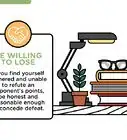wikiHow is a “wiki,” similar to Wikipedia, which means that many of our articles are co-written by multiple authors. To create this article, 81 people, some anonymous, worked to edit and improve it over time.
There are 13 references cited in this article, which can be found at the bottom of the page.
wikiHow marks an article as reader-approved once it receives enough positive feedback. This article received 20 testimonials and 89% of readers who voted found it helpful, earning it our reader-approved status.
This article has been viewed 671,215 times.
Learn more...
The word "philosophy" means a love of wisdom. A philosopher, however, is not just a person who knows a great deal or loves to learn (a pan-academic). Rather, the philosopher is one who engages actively in critical thought about big questions that have no obvious answers.[1] The philosopher's life is not an easy one, but if you delight in exploring complex relationships and thinking deeply about important, but often vexing, topics, the study of philosophy might be your destiny, if there is any such thing.
Steps
Mental Preparation
-
1Question everything. Philosophy requires one to rigorously and critically examine life and the world in its totality. To do this, one must be free of prejudice, ignorance, and dogma.[2]
- The Philosopher is one who dwells in reflection and observation: they take every experience and seeks to understand it, even if doing so requires one to be brutally honest. This requires one to cast off the preconceived notions that one may have accepted in the past and subject all of one's beliefs to critical scrutiny. No belief or source of ideas is immune, regardless of its origin, authority, or emotional power. To think philosophically, one must think for one's self.[3]
- Philosophers do not simply form opinions and chat idly. Philosophers, instead, develop arguments, based on premises that can and will be challenged by other philosophers.[4] The goal of philosophical thinking is not to be right, it is to ask good questions and seek understanding.
-
2Read philosophy. Hundreds of years of philosophical thinking came before your own examinations of the world and, learning about the ideas of other philosophers will raise new ideas, questions, and problems to think about. The more philosophy you can read, the better a philosopher you can become.[5]
- Few tasks are more important to the philosopher than reading. Professor of philosophy Anthony Grayling described reading as a duty of "extreme intellectual importance," and suggests reading literary works in the morning and philosophical works later in the day.[6]
- Read the classics. Some of the most enduring and powerful philosophical ideas in Western philosophy come from long-philosophers like Plato, Aristotle, Augustine, Thomas Aquinas, Duns Scotus,Hume, Descartes, and Kant, and today's philosophers recommend familiarizing yourself with their important works.[7] In Eastern philosophy, the ideas of Lao-Tse, Confucius, and Buddha have been equally enduring, and deserve attention from any budding philosopher.[8]
- At the same time, if you start reading something by one of these thinkers and it isn't stimulating to you, don't be afraid to set it aside and pick up something else that you find more compelling.[9] You can always come back to it later.
- Pursuing a bachelor's degree in philosophy is a good way to structure these studies, but many great philosophers were also self-taught.
- Balance your copious reading with self-investigative writing: where reading broadens your perspective of the world, your writing will give you depth of understanding. Start writing down your reflections on the philosophical texts you are reading right away.
Advertisement -
3Think big. Spend time thinking about the world, what it means to live, to die, to exist, and what the point of it is. These topics lead to big, unanswered, often unanswerable questions, questions only philosophers, young children, and other highly curious individuals have the imagination and courage to ask.
- More "practical" topics, like those derived from the social sciences (e.g. political science or sociology), the arts, and even the physical sciences (e.g. biology and physics) can also provide fodder for philosophical thinking.[10]
-
4Engage in debate. While developing your critical thinking, you should take part in any debate you can. This will increase your ability to think freely and critically. Indeed, many philosophers see the vigorous exchange of ideas as an important path toward truth.[11]
- The goal here is not to win a contest, but to learn and develop your thinking skills. There will always be someone who knows something better than you, and arrogance will hinder your ability to learn from them. Keep an open mind.[12]
- Keep your arguments sound and logical. The conclusions should follow from the premises, and the premises should have evidence backing them.[13] Weigh the actual evidence, and avoid being swayed solely due to repetition or ignorance. Practicing the construction and criticism of arguments is crucial to any developing philosopher.
Practicing Philosophy
-
1Develop an approach to investigation and practice it. An important part of philosophy is the investigation and analysis of the world. Put differently, a central task of philosophy is finding ways to define and describe the fundamental structures and patterns of life, often by breaking them down into smaller component parts.[14] [15]
- There is no single, superior method of investigation, so you will need to develop an approach that is both intellectually rigorous and compelling to you.
- The decisions you'll be making in this stage involve what sorts questions you'll be asking or relationships you'll be exploring. Are you interested in the human condition? Political arrangements? Relationships between concepts, or between words and concepts? Different areas of focus may lead you to different approaches to asking questions and forming theories. Your reading of other philosophical works will help you make these determinations by exposing you to the ways others have approached philosophy in the past.
- For example, some philosophers only trust their minds and logic, and not the senses, which may at times deceive us. Descartes, one of the most respected philosophers in history, was one who took this approach.[16] By contrast, others use their own first-person observations of the world around them as the basis for investigations into the nature of consciousness.[17] These are two very different but equally valid approaches to philosophizing.
- If you can, it's great to be the source of your own investigation. Since you're always available to yourself, any line of investigation about yourself (and there can be many) allows you to always make some progress. Consider the basis for what you believe. Why do you believe what you believe? Start from scratch and interrogate your reasoning.
- Wherever you decide to focus your inquiry, try to be systematic in your thinking. Be logical and consistent.[18] Engage in comparison and contrast, take things apart mentally to try to understand how they work, ask what would happen if two things were combined (synthesis), or if something was removed from a process or relationship (deletion). Keep asking these questions in different circumstances.
- There are 4 domains to help you think: convergent awareness (all existing understandings - your investigations will start here), critical thinking (logic and deduction), creative thinking (induction and extrapolation), and divergent thinking (free association and brainstorming). These strategies progress from what is known to what you wish to discover by increasing the cognitive window, and as such, are very powerful reflective tools.
-
2Start writing down your ideas. Write down what you think about the subjects of your inquiry, including ideas you think you shouldn't write down (possibly because you think others may think they are stupid). While you may not be arriving at any striking conclusions, you will be exposing your own assumptions to yourself. You will probably marvel at how silly some of your assumptions can be, and in the process you will mature.
- If you don't know where to begin you can start with questions that other philosophers have explored before, such as how one should treat the existence of god, or whether we have free will or are controlled by fate.
- The true power of philosophy lies in the continuity of thought that you'll be maintaining in your writing. As you investigate a concern, a single entry may do little on its own, but as you return to that concern throughout the day(s), the different circumstances you encounter in a day will allow you to bring fresh insights to your investigation. It is this cumulative power of thought that will bring you to those 'Eureka!' moments.
-
3Develop a philosophy of life. As you write, you should begin to develop your own philosophical perspective, arriving logical and well-considered ideas about life and the world.
- It is common for philosophers to adopt a perspective over time, especially about a specific issue. These are frameworks, patterns of thought. Many of the greatest philosophers have developed such frameworks. At the same time, remember to examine each issue with a critical eye.
- The central task that underlies the effort of the philosopher is that of model development. Whether we're aware of it or not, each of us has an abductive model of reality that is constantly modified to fit our observations. We can employ deductive reasoning (e.g. "given the existence of gravity, the stone is obviously going to fall when I let it go"), and inductive reasoning (e.g. "I've seen that weather pattern many times; I'll bet it'll rain again") to create this model of successive approximations. The process of developing a philosophical theory is the process of making these models explicit and scrutinizing them.
-
4Rewrite and get feedback. Through several drafts, you should organize your ideas more formally and let others read your work. You can ask friends, relatives, teachers, or classmates to offer some thoughts on your work, or you can post your writings online (through a website, a blog, or a message board) and look for responses there.
- Be prepared to receive criticism, and use it to improve your own ideas. Always remember to analyze the evidence presented in order to find understanding, and let the perspectives and critiques of others help you expand your own thinking.[19]
- Be wary of criticisms that show little or no signs of thoughtful exchange (e.g. that your premise was understood, or even read). Such critics have assumed that they are thinkers without actually accepting the philosophical discipline presented here, but still feel they are entitled to philosophical consideration. Such 'debates' will go on fruitlessly and ad nauseam.
- After you receive feedback from your readers, rewrite again, incorporating any feedback you find useful.
Becoming a Professional
-
1Get an advanced degree. To successfully pursue philosophy as a career, you must acquire a doctorate or, at very least, a master's degree.
- Earning a living from philosophy means using your knowledge and (hopefully) wisdom to produce original works of philosophical thought and, usually, to teach others about the field. In other words, the professional philosopher of today is typically an academic, and this requires an advanced degree.
- Equally important, the rigors of graduate school will help you further your philosophical thinking. In particular, you'll need to learn how to write in the very disciplined style that academic journals demand.
- Spend some time exploring the philosophy programs offered by a variety of different universities. Pick the ones that sound best to you and start applying for programs. Graduate school applications are highly competitive, so don't expect to be accepted to the first program you apply to. It's a good idea to apply to several schools, ideally 10 to 12.
-
2Publish your ideas. Even before you have completed your graduate studies, you should begin the work of trying to publish your philosophical insights.
- There are many academic journals that focus on philosophy. Publishing in these journals will help you gain a reputation as a philosophical thinker and improve your chances of getting hired as a philosophy professor.
- It's also a good idea to present your work at academic conferences. Taking part in these events is a good opportunity to get more feedback from other professional thinkers and is good for your career prospects as well.
-
3Learn to teach. Many of history's greatest philosophers have been teachers. Beyond this, any university that might want to hire you to study philosophy professionally will also expect you to teach other budding philosophers.
- Your graduate program will most likely give you some opportunities to teach undergraduate students and develop your pedagogical skills.
-
4Get a job. After you've completed your graduate studies, start looking for a job as a philosophy professor. This process is arguably even more competitive than applying for graduate schools. Be prepared for many rejections before you finally succeed.
- Many philosophy graduates are unable to find work in academia. Nonetheless, the skills you'll learn in your graduate studies will be helpful in many fields of employment, and you can always keep working on philosophy in your free time.[20] Remember that the writings of many of history's greatest philosophers were never recognized as important during their lifetimes.
- The benefits of disciplined thinking cannot be overestimated, even without serving as a vocation. In today's environment, with ready access to enormous amounts of information, some of it specious, or worse, deliberately poisoning of a person's mental health, it is the investigative mind of the philosopher that possesses the tools to recognize half truths or complete falsehoods.
Community Q&A
-
QuestionI'm an art student right now because I thought that was my passion, but lately I have an interest in philosophy. What should I do?
 Community AnswerYou can seek a way to combine your interests. Great art is often deeply philosophical, and great philosophy deeply artistic.
Community AnswerYou can seek a way to combine your interests. Great art is often deeply philosophical, and great philosophy deeply artistic. -
QuestionI have little to no money for college. How would I go about educating myself?
 Community AnswerBecome an autodidact. Read everything: novels, history, religion, philosophy, whatever. Think about what you read. Talk to others about what you read. Ask intelligent questions. Audit classes about subjects you are interested in. Do the same work as the paying students. Ask more questions. Consider the source. Learn to reason critically.
Community AnswerBecome an autodidact. Read everything: novels, history, religion, philosophy, whatever. Think about what you read. Talk to others about what you read. Ask intelligent questions. Audit classes about subjects you are interested in. Do the same work as the paying students. Ask more questions. Consider the source. Learn to reason critically. -
QuestionCan I become a philosopher without any degree but by just being able to understand the world, god, nature and religions?
 Shadowmusic7Community AnswerYes. By definition, a philosopher is a person who offers views or theories on profound questions in ethics, metaphysics, logic and other related fields. This means if you have the right mindset, you can become a philosopher.
Shadowmusic7Community AnswerYes. By definition, a philosopher is a person who offers views or theories on profound questions in ethics, metaphysics, logic and other related fields. This means if you have the right mindset, you can become a philosopher.
Warnings
- Don't be afraid to voice a radical opinion, but do not allow its novelty and originality prevent you from seeing the validity of more conservative ideas.⧼thumbs_response⧽
- In order to minimize the contentions of people who feel they are smart, but resent your efforts to be smarter through philosophical investigation, a degree of modesty will need to be accepted by you. For example, wearing a t-shirt announcing 'I am a philosopher’ will be met with derision, if not outright ass-kicking. You’ll need to accept that while you have investigated concerns that most people respond to with ‘I dunno’, people jealously defend their dignity, even if they subscribe to a list of hogwash and pseudo-science. Also, while you can be wary of these people, you can’t be disdainful of them. The world requires all manner of personalities, and your choice to be reflective enhances your life in ways that even endless wealth can’t. Your personal self-worth will run considerably deeper than for most people for this effort, and you'll never see the many psychoses that plague many. Enjoy that.⧼thumbs_response⧽
- Implicit in the philosopher's ongoing quest is the assumption that at no time do they have the luxury to "grow old gracefully." The quest for greater truths means that you will need to employ trial and error in your life (the successive approximations to those greater truths), and this means you may have the occasional pratfall. This is a small price to pay for the awareness you have gained, and eventually you will have learned to be the first to enjoy a good laugh, even if it is at your own expense!⧼thumbs_response⧽
- By philosophizing, your ideas will mature, so much so that you may outgrow friends. You may find that your friends are not interested, or they are unwilling to compromise their ideas. This is normal, though it can be isolating.[22] The philosopher's quest is a personal one, and the life of a philosopher can be solitary.[23]⧼thumbs_response⧽
References
- ↑ http://www.qcc.cuny.edu/socialsciences/ppecorino/intro_text/Chapter%2012Conclusion/What_is_Philosophy.htm
- ↑ http://www.theguardian.com/teacher-network/2012/aug/14/philisophical-teaching-students
- ↑ http://www.theguardian.com/teacher-network/2012/aug/14/philisophical-teaching-students
- ↑ https://philosophynow.org/issues/81/How_To_Be_A_Philosopher
- ↑ https://philosophynow.org/issues/81/How_To_Be_A_Philosopher
- ↑ http://blogs.wsj.com/indiarealtime/2011/01/23/how-to-become-a-philosopher-a-beginner%E2%80%99s-guide/
- ↑ http://www.theguardian.com/books/1999/dec/10/top10s.philosophy
- ↑ http://www.philosophicalsociety.com/History%20Of%20Philosophy.htm
- ↑ https://philosophynow.org/issues/81/How_To_Be_A_Philosopher
- ↑ https://philosophynow.org/issues/81/How_To_Be_A_Philosopher
- ↑ https://philosophynow.org/issues/81/How_To_Be_A_Philosopher
- ↑ http://blogs.wsj.com/indiarealtime/2011/01/23/how-to-become-a-philosopher-a-beginner%E2%80%99s-guide/
- ↑ http://ocw.mit.edu/courses/linguistics-and-philosophy/24-03-relativism-reason-and-reality-spring-2005/lecture-notes/l1_think_phlospr.pdf
- ↑ http://plato.stanford.edu/entries/analysis/
- ↑ http://philospir.pagesperso-orange.fr/Lesson3.htm
- ↑ http://www.iep.utm.edu/descarte/#SH4b
- ↑ http://plato.stanford.edu/entries/phenomenology
- ↑ http://www.qcc.cuny.edu/socialsciences/ppecorino/intro_text/Chapter%2012Conclusion/What_is_Philosophy.htm
- ↑ https://philosophynow.org/issues/81/How_To_Be_A_Philosopher
- ↑ https://www.theatlantic.com/business/archive/2014/07/what-do-philosophers-do/374036/
- ↑ http://quoteinvestigator.com/2011/12/13/swap-ideas/
- ↑ http://www.theguardian.com/teacher-network/2012/aug/14/philisophical-teaching-students
- ↑ http://philospir.pagesperso-orange.fr/Lesson3.htm
About This Article
To become a philosopher, try to question and reflect on everything you're told since philosophers don't accept things at face value. You should also spend time thinking about big, unanswerable questions, like what it means to live and what the point of existence is. To get inspired, read works by famous philosophers that came before you, like Plato, Thomas Aquinas, and Confucious. In addition to reading and thinking about philosophy, try engaging your friends or family members in philosophical debates, which will help you develop critical thinking skills. To learn how to become a professional philosopher, scroll down!





















-Step-10-Version-3.webp)



















































